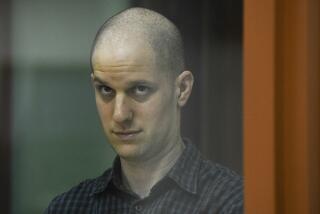Alleged U.S. Spy Says Russia Bars Key Facts
- Share via
MOSCOW — American businessman Edmond D. Pope, in his first courtroom defense, proclaimed his innocence Monday and accused Russian investigators of deliberately excluding evidence that would clear him of spying charges.
“It has become clear that there are very many inaccuracies, mistakes and instances of falsification and juggling of facts” in the prosecution case, said Pope’s lawyer, Pavel Astakhov.
Pope, 54, a retired naval intelligence officer, runs a marine technology company based in State College, Pa. He was arrested April 3 in Moscow for purchasing what Russian officials describe as top-secret plans for an underwater missile. Pope and his lawyers contend that the missile--the high-speed Shkval torpedo--has been sold openly on the international market for years.
Tensions over the case have escalated on both sides in recent weeks. The State Department has cited the Pope case in cautioning businesspeople about doing deals in Russia, and the U.S. House of Representatives has passed a resolution demanding an end to financial assistance to Russia if Pope is not freed.
Russia has just as vehemently insisted that Pope was caught red-handed and must be tried according to Russian law. If convicted, Pope would face up to 20 years in prison.
The specific charges against Pope are secret, and the trial is taking place behind closed doors. Pope himself saw the indictment only last week. Astakhov said that on Monday, Pope read the first part of an 88-point rebuttal in court, claiming that facts cited in the indictment were incorrect and that his statements to investigators had been distorted.
“These 88 points are expected to show the court that there is a world of difference between the real state of affairs and the way the case is seen by investigators,” Astakhov said.
Since the trial began Wednesday in Moscow City Court, Judge Nina Barkina has denied every defense motion and excluded evidence Astakhov considers crucial to Pope’s defense.
For instance, Barkina on Friday refused to admit into evidence a letter from the institute that provided the plans to Pope in which institute officials said the technology was legal to export. She also has refused to call as a defense witness a professor at the institute who was Pope’s contact and to assign Pope a translator who is not an employee of Russia’s Federal Security Service, or FSB, the KGB’s main successor.
“Documents that prove my client innocent are simply excluded, and those that were previously included have been removed under various pretexts,” Astakhov said.
The judge has also turned down Pope’s request for a medical examination by U.S. doctors. Pope has been in remission from a rare form of bone marrow cancer and has expressed fears that the cancer may have returned. Russian doctors have declared him fit for trial, but Pope and his lawyer say his form of cancer is so unusual that Russian doctors may not be able to diagnose it.
Some commentators have suggested that the judge is trying to get the speediest possible conviction, which would then permit the Kremlin to bargain with the United States for Pope’s release.
“If the Kremlin wants to put Pope behind bars, he will definitely end up there and no force on Earth will help him,” said Russian military analyst Pavel Felgenhauer. “After that, the bargaining will begin, and he may well be released in exchange for certain concessions from the United States.”
The Shkval, or squall, torpedo is an ultra-fast underwater missile that travels on a cushion of air. According to statements by the FSB, even though the missile has been sold on the international market, there are aspects of its design that remain secret.
Still, Felgenhauer said, these days in Russia there is a blurry line between what is secret and what is not.
“On one hand, almost all military-related information is top-secret, while on the other, some of it gets openly printed in various special-interest publications,” Felgenhauer said. “The issue of military secrecy in Russia is a total mess, and no one can be sure whether the material he gets is secret or not. All this makes Pope’s case really murky, and a lot will depend on the instructions the investigators and the judge get from their superiors.”
*
Alexei V. Kuznetsov of The Times’ Moscow Bureau contributed to this report.
More to Read
Sign up for Essential California
The most important California stories and recommendations in your inbox every morning.
You may occasionally receive promotional content from the Los Angeles Times.













